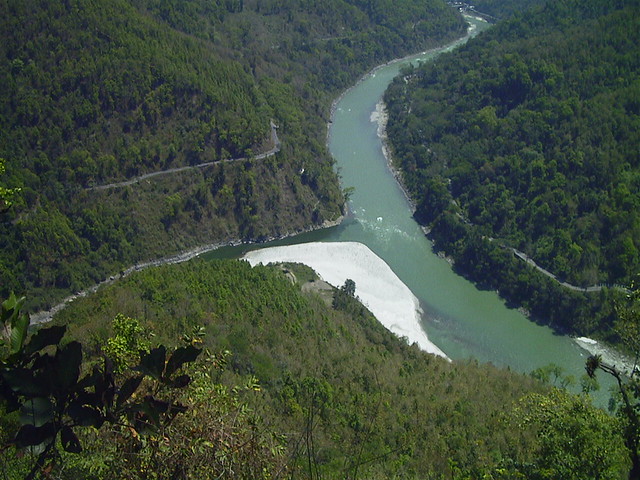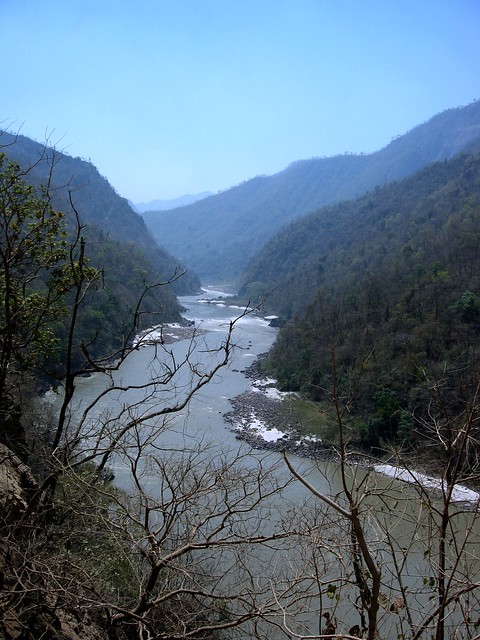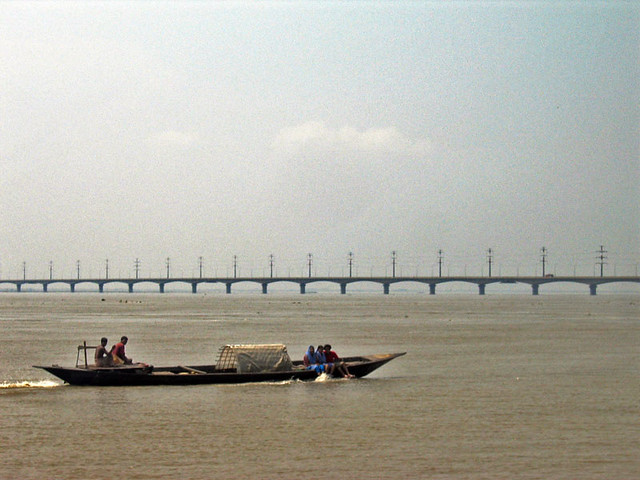
India and Bangladesh share 54 rivers between them. Despite setting up a Joint River Commission for water management as early as 1972, tensions between the countries on how to share resources recently came to a head in a dispute over the Teesta River. At stake are the lives of countless people from West Bengal and Bangladesh who depend upon the river for survival.
To date, only one comprehensive river pact has been signed by India and Bangladesh – a 1996 bilateral treaty that established a 30-year water-sharing arrangement between the two countries. This was set to change in September 2011 when India’s Prime Minister, Dr. Manmohan Singh, was due to sign a pact with his Bangladeshi counterpart regarding access and use of the Teesta River.
The Teesta – which has its source in Sikkim – flows through the northern part of West Bengal in India before entering Bangladesh, where after coursing through about 45km of irrigable land, merges with the Brahmaputra River (or Jamuna when it enters Bangladesh). In 1983, an ad-hoc water sharing agreement was reached between India and Bangladesh, whereby both countries were allocated 39% and 36% of the water flow respectively. The new bilateral treaty expands upon this agreement by proposing an equal allocation of the Teesta River.
However, the deal fell through when the then newly elected Chief Minister of West Bengal, Ms. Mamata Banerjee, refused to approve the treaty, fearing that the loss of higher volume of water to lower riparian would cause problems in the northern region of state, especially during drier months.

Given that water is a state issue in India, and that Banerjee’s political party, the All India Trinamool Congress, is a key coalition partner of the ruling central government, the deal could not go through without her approval. While a large section of the Bangladeshi populace as well as the Indian media vilified her rigid stance, her opposition to the terms of the treaty was not without its share of support.
In May 2012, during a visit to India, the Bangladesh Foreign Minister, Ms. Dipu Moni, warned that bilateral relations would be complicated if India fails to deliver on the Teesta water-sharing agreement.
Despite this pressure tactic, the treaty remains a slow burner as India continues its efforts of domestic political consensus building. However, the Indian Minister for External Affairs, S.M. Krishna tried to diffuse tensions and assured Bangladesh that India remains committed to an early solution on the issue of sharing Teesta waters.

Bangladesh also wants a quick resolution to the issue, and may even be willing to soften their stance because of mounting pressure at home to get the deal done.
Bangladeshi journalist and blogger Farid Ahmed writes:
‘It is apparently quite clear now that…Bangladesh for now has failed to ensure that India inks a deal…to share water of common rivers, mainly Teesta … Now it is Bangladesh which has to do what it should have started long ago. Apart from traditional diplomacy, they should have transmitted the feelings of its public to those on the other side of the border. The sky is locked for Dhaka as no Bangladeshi channels are broadcasted by Indian cable operators… Most Indian newspapers were supportive for Bangladesh’s cause on Teesta. That’s a positive side. What about engaging with West Bengal’s public?
Nevertheless, looking beyond the political rhetoric, West Bengal’s concerns about water security for its northern region cannot be overlooked and need to be allayed. India is already beginning to feel the strain on its water security given the ever rising demands for more water for its burgeoning population. According to a 2010 report ‘Water Security for India: The External Dynamics’ published by the Institute for Defence Studies and Analyses (IDSA):
India is facing a serious water resource problem and as trends suggest, it is expected to become ‘water stressed’ by 2025 and ‘water scarce’ by 2050
Both countries, therefore, need to develop a well thought out, balanced treaty that will enable equitable sharing of the waters of the Teesta, thereby enhancing bilateral ties and reducing the possibility of water conflict.
For further information on the topic, please view the following publications from our partners:
India-Bangladesh Relations: Issues, Problems and Recent Developments, from the Institute of Peace and Conflict Studies (IPCS), New Delhi , India.
Water Issues between Nepal, India and Bangladesh: A review of Literature, from the Institute of Peace and Conflict Studies (IPCS), New Delhi , India.
Tackling the Water Crisis: Reshaping the Future of Foreign Policy, from the Foreign Policy Centre (FPC), London, United Kingdom.
For more information on issues and events that shape our world please visit the ISN’s Security Watch and Editorial Plan Dossiers.


One reply on “India, Bangladesh: Water Disputes and River Diplomacy”
A nice area with beatiful nature, great!